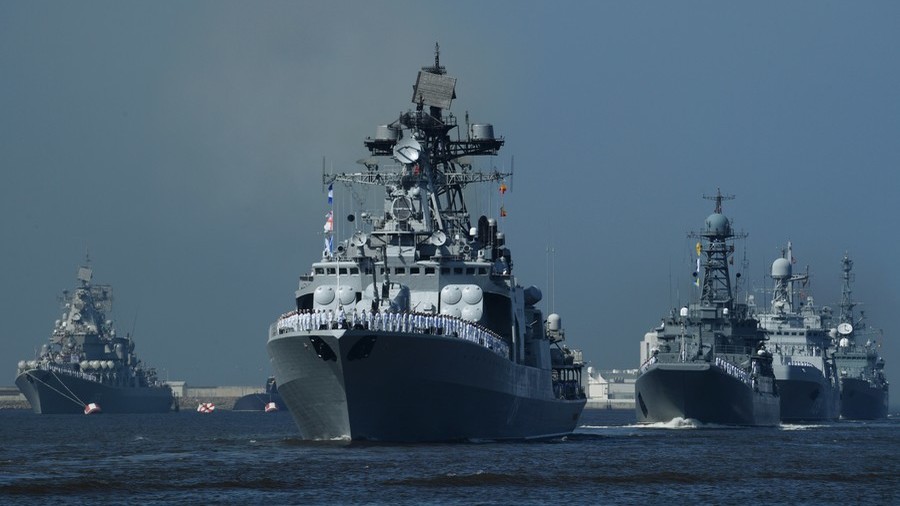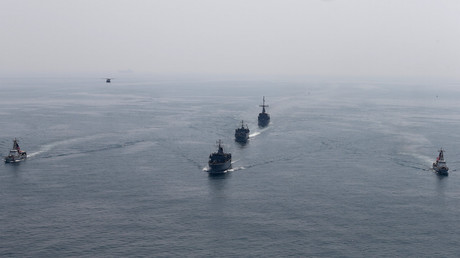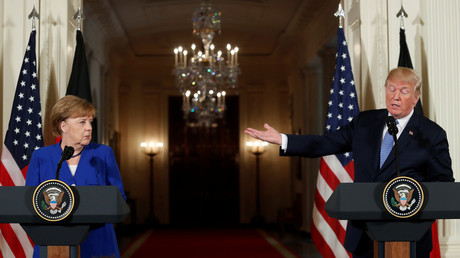Naval
blockade would mean ‘war’: Moscow slams US idea of hampering
Russian trade

RT,
30 September, 2018
“A
US blockade of Russia would be equal to a declaration of war under
international law,” said
the head of the Russian Senate’s Information Policy Committee,
Aleksey Pushkov, commenting on a report that US Internal Secretary
Ryan Zinke suggested the US could use the navy to block Russian
energy from hitting Middle East markets.
Pushkov
also called Zinke’s claim that trade expansion is the real reason
behind Russia’s involvement in Syria “absolute
nonsense.”
The
very idea that Russia could potentially supply energy to the Middle
East, which is literally “oozing
with oil,” is
absolutely detached from reality, Pushkov said. Indeed, Russia does
not supply any energy to the region, which is itself a major oil
exporter, and has never announced plans to do so.
The
Russian senator added that Zinke’s statement is “on
par” with
Sarah Palin’s claim that she was qualified to talk about Russia
since “they’re
our next-door neighbors, and you can actually see Russia here from
Alaska.” The
former Alaska governor made the statement in an interview when she
was the Republican vice-presidential candidate in the 2008 US
election.
Attempts
to exert pressure on Russia “are
not going to end in anything good,” a
member of the Russian Senate’s Defense and Security Committee,
Franz Klintsevich, told journalists, adding that they would lead “to
a major scandal” at
the very least, and Washington “should
clearly understand it.”
Russian
MPs called Zinke’s words “disturbing.”
“It is unsettling that our partners once again resort to threats,
sanctions and unfriendly actions instead of discussing the pressing
international issues,” a
member of the State Duma International Affairs Committee, Anton
Morozov, said. He also said that Russia “has
something to respond with” but
that such actions would only lead to an escalation of tensions, and
called for dialog instead.
Washington
seems to be bothered by Moscow’s international trade. The Trump
administration has been seeking to replace Russia as Europe’s gas
supplier by boosting exports of its liquefied natural gas, even
though Russian gas is a cheaper option for Europe.
US
officials, including President Donald Trump himself, have repeatedly
pressed Germany to pull out of the “inappropriate” Nord
Stream 2 pipeline project, which is set to double Russia’s natural
gas transport capacity to 110 billion cubic meters. While Moscow has
repeatedly stated that it is a purely economic project, Trump claims
it will make Germany a “captive” of
Russia.
The
US is not focusing on the energy trade alone, as it has also
threatened to impose sanctions on countries buying Russian arms in
what could be another example of competition between the two nations.
These efforts, however, seem to be in vain as well.
Most
recently, India cleared the way for the purchase of Russian frigates
and air defense systems. Turkey also defied threats from the US and
said it does not need anyone’s permission to buy Russia’s S-400
missile systems. Even close US ally Saudi Arabia is now in talks with
Russia to purchase the same defense systems. Moscow has repeatedly
denounced US attempts to hamper its trade under various pretexts as
unfair competition.
US
Interior Secretary Ryan Zinke said a naval blockade of Russia was an
option for limiting Russia’s role on the global energy market,
Washington Examiner quoted him as saying.
"The
United States has that ability, with our Navy, to make sure the sea
lanes are open, and, if necessary, to blockade ... to make sure that
their energy does not go to market," Zinke was quoted as saying
during an industry event in Pittsburgh hosted by the Consumer Energy
Alliance.
According
to the paper, the minister said that the use of the hydraulic
fracturing, or fracking, technology gave Washington an advantage over
Russia and Iran because its reduced Washington’s dependence on
foreign hydrocarbons.
At
the same time, Zinke said the Russian economy strongly relied on oil
and gas revenues.
"I
believe the reason they are in the Middle East is they want to broker
energy just like they do in eastern Europe, the southern belly of
Europe," he said.
According
to the Interior Secretary, Washington was also considering economic
measures to put pressure on Russia and Iran in order to squeeze them
out of the global energy market.
"The
economic option on Iran and Russia is, more or less, leveraging and
replacing fuels," Zinke said. "We can do that because ...
the United States is the largest producer of oil and gas.".
RUSSIA
RESPONDS
Russia
warned on Sunday (30 September) that a naval blockade by the United
States, as proposed by its Secretary of the Interior Ryan Zinke,
would be a declaration of war, according to international standards.
"As
well as a stupid statement, it is a threat that, if fulfilled, would
become a declaration of war, as stipulated by international
standards" said Russian Senator Alexei Pushkov.
The
legislator advised Zinke that in some cases it was better to use
chewing gum, instead of saying something.
Pushkov
reacted to recent statements by Zinke, who considered that the
American Navy can assume the control of the maritime traffic and
block the Russian tankers, if needed.
Russia's
economy is based on the sale of crude oil and its participation in
conflicts like that of Syria seek to sell hydrocarbons there,
estimated Zinke, whose country entered that country without Damascus'
consent and under the pretext of fighting terrorism.
Unlike
the United States, whose presence in Syria is illegal, Russia was
called by the Syrian government to cooperate with its combat aviation
to fight terrorist groups.
Washington,
on the other hand, is accused by the Syrian government of financing,
equipping and training extremist formations that confront the
government army.



No comments:
Post a Comment
Note: only a member of this blog may post a comment.